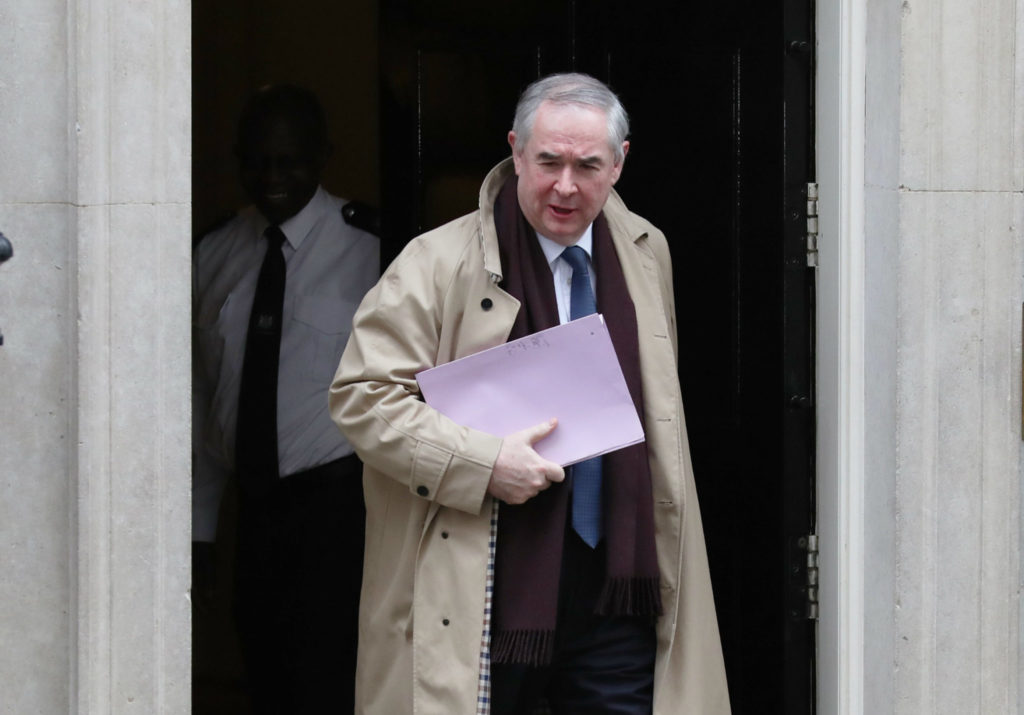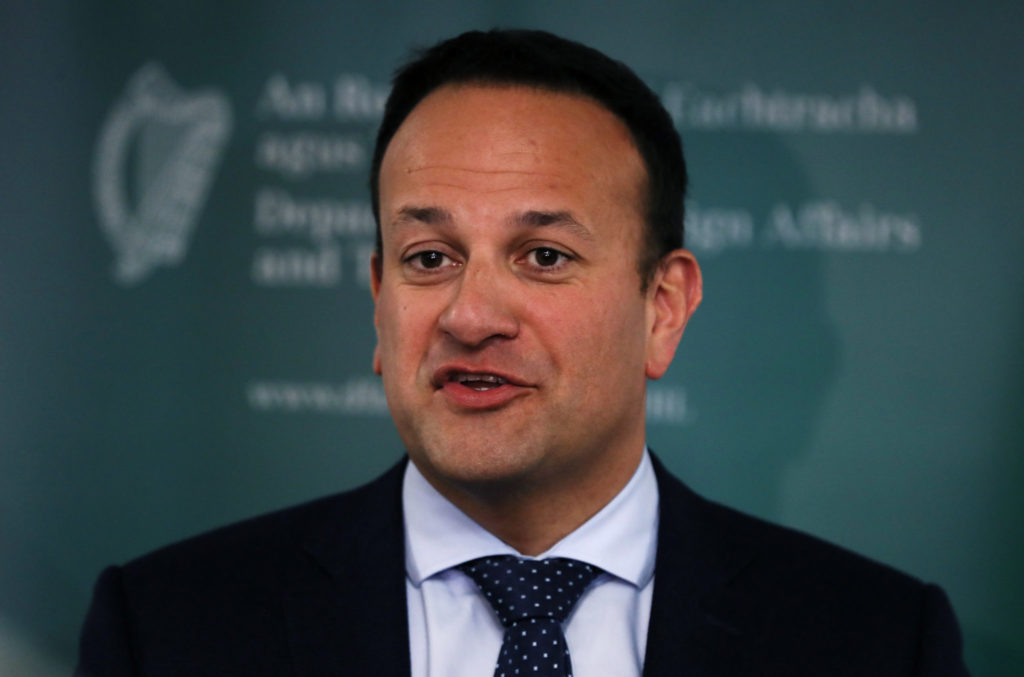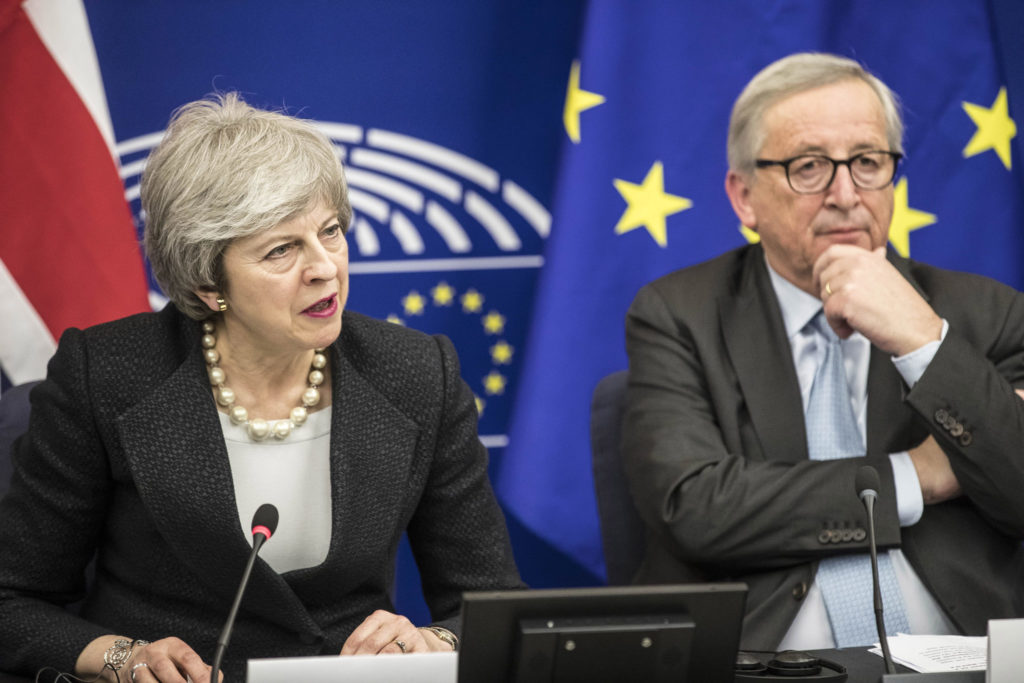Northern Ireland's Democratic Unionist Party has said sufficient progress has not been made for them to support the UK's Brexit deal.
The party, led by Arlene Foster, currently supports British Prime Minister Theresa May's Conservative Party as part of a confidence and supply deal at Westminster.
MPs in the House of Commons will vote later on the Brexit deal, after Mrs May secured 'legally binding' Irish backstop guarantees.
The UK's Attorney-General Geoffrey Cox has said the legal risk from the backstop "remains unchanged", despite the fresh assurances from the EU.
While a DUP spokesman said: "We recognise that the Prime Minister has made limited progress in her discussions with the European Union.
"However in our view sufficient progress has not been achieved at this time.
"Having carefully considered the published material as well as measuring what has been achieved against our own fundamental tests, namely the impact of the backstop on the constitutional and economic integrity of the union of the United Kingdom, it is clear that the risks remain that the UK would be unable to lawfully exit the backstop were it to be activated.
"The Attorney-General's legal advice is clear in his last paragraph 'the legal risk remains unchanged that if through no such demonstrable failure of either party, but simply because of intractable differences, that situation does arise, the United Kingdom would have, at least while the fundamental circumstances remained the same, no internationally lawful means of exiting the protocol's arrangements , save by agreement.'
"We want to see a deal which works for every part of the United Kingdom. We will support the right deal which respects the referendum result and Northern Ireland's place as an integral part of the United Kingdom."
Latest ⬇️ pic.twitter.com/TfDgzHorUH
— DUP (@duponline) March 12, 2019
Ahead of tonight's 'meaningful vote' on the deal, many MPs in Westminster had been awaiting Mr Cox's updated advice before reaching their conclusion about the new guarantees.
In his advice, he concluded that the new assurances "reduce the risk" that the UK could be trapped in the backstop as a result of "bad faith" from the EU.
However, he added: "The legal risk remains unchanged that if through no such demonstrable failure of either party, but simply because of intractable differences, that situation does arise, the United Kingdom would have, at least while the fundamental circumstances remained the same, no internationally lawful means of exiting the Protocol’s arrangements, save by agreement."
The advice raised serious questions over whether the assurances will be enough to win support from pro-Brexit Conservative MPs.
The hardline pro-Brexit European Research Group (ERG) is recommending MPs do not back the deal - a significant blow to its chances of passing.
 UK Attorney-General Geoffrey Cox leaves Downing Street, London, ahead of stating his legal advice over Brexit to MPs in the House of Commons | Image: Steve Parsons/PA Wire/PA Images
UK Attorney-General Geoffrey Cox leaves Downing Street, London, ahead of stating his legal advice over Brexit to MPs in the House of Commons | Image: Steve Parsons/PA Wire/PA ImagesLabour MP Keir Starmer, meanwhile, suggested Mr Cox's conclusions meant the British government's strategy "is now in tatters".
UK Labour leader Jeremy Corbyn has previously indicated his party will not vote for the agreement.
Speaking in the House of Commons, Mr Cox told MPs they are ultimately making a "political decision".
He argued: "The question for the House is whether, in the light of these improvements [and] as a political judgement, the House should now enter into those arrangements."
New guarantees
Mrs May made a last minute dash to Strasbourg on Monday evening for final talks with European Commission President Jean-Claude Juncker.
In a late night press conference, she claimed to have secured "legally binding changes" in a bid to win over MPs who previously rejected the withdrawal agreement.
Speaking on Tuesday morning, Taoiseach Leo Varadkar said he hopes the deal will now pass through the House of Commons.
 Taoiseach Leo Varadkar Picture by: Brian Lawless/PA Wire/PA Images
Taoiseach Leo Varadkar Picture by: Brian Lawless/PA Wire/PA ImagesHe stressed that the new guarantees "do not reopen" the withdrawal agreement or undermine the backstop.
He observed: "The further text agreed yesterday provide additional clarity, reassurance and guarantees sought by some to eliminate doubt or fears, however unreal, that the goal of some was to trap the UK indefinitely in the backstop. It is not.
"These doubts and fears can now be put to bed."
He added: "I new feel that for the remains of the day we need to give MPs in Westminster the time and space to consider what is now on the table."
Legal instrument
Following the Strasbourg talks, the EU published a legal 'instrument' which clarifies the withdrawal agreement without reopening it.
A second document supplements the previously agreed 'political declaration' on the future relationship between the EU and UK.
The documents offer assurances that both sides are committed to 'work speedily' to find alternative arrangements by the end of 2020 so the backstop won't need to be triggered.
The documents provide further guarantees that the UK will not be trapped indefinitely in a backstop.
They stress that either side can enact a "unilateral, proportionate suspension" of the backstop if the other side is found in breach of their obligations.
 Britain's Prime Minister Theresa May, left, and European Commission President Jean-Claude Juncker attend a media conference at the European Parliament in Strasbourg, eastern France, Monday, March 11, 2019. Prime Minister Theresa May is making a last-ditch attempt to get concessions from EU counterparts on elements of the agreement they all reached late last year. (AP Photo/Jean-Francois Badias)
Britain's Prime Minister Theresa May, left, and European Commission President Jean-Claude Juncker attend a media conference at the European Parliament in Strasbourg, eastern France, Monday, March 11, 2019. Prime Minister Theresa May is making a last-ditch attempt to get concessions from EU counterparts on elements of the agreement they all reached late last year. (AP Photo/Jean-Francois Badias)Mrs May said: "The legal instrument that we have agreed is an addition to the Withdrawal Agreement. It has the same legal status as the Withdrawal Agreement. It is legally binding.
"That is what Parliament asked us to secure and that is what we have secured."
"No third chance"
Mr Juncker, meanwhile, warned there would be no further talks if MPs again rejected the deal.
He explained: "There will be no new negotiations. It is this. In politics, sometimes you get a second chance.
"It is what we do with the second chance that counts. Because there will be no third chance."
Our agreement provides meaningful clarifications & legal guarantees to the Withdrawal Agreement & #backstop. The choice is clear: it is this deal, or #Brexit may not happen at all. Let’s bring the UK’s withdrawal to an orderly end. We owe it to history. https://t.co/lfy9eehEZi pic.twitter.com/XCqcLwZV7V
— Jean-Claude Juncker (@JunckerEU) March 11, 2019
If the deal is voted down later, MPs will next vote on whether to reject a no deal Brexit.
If that prospect is ruled out, they will be then asked whether they approve a brief delay in the Brexit process.
Main image: British Prime Minister Theresa May takes questions on Brexit in London's House of Commons
Additional reporting: Jack Quann








